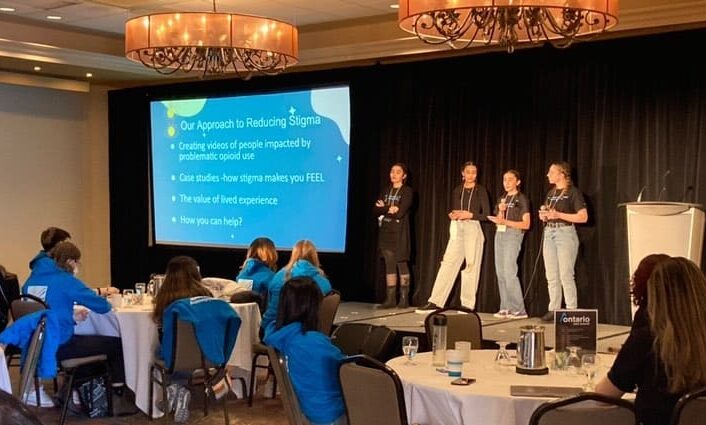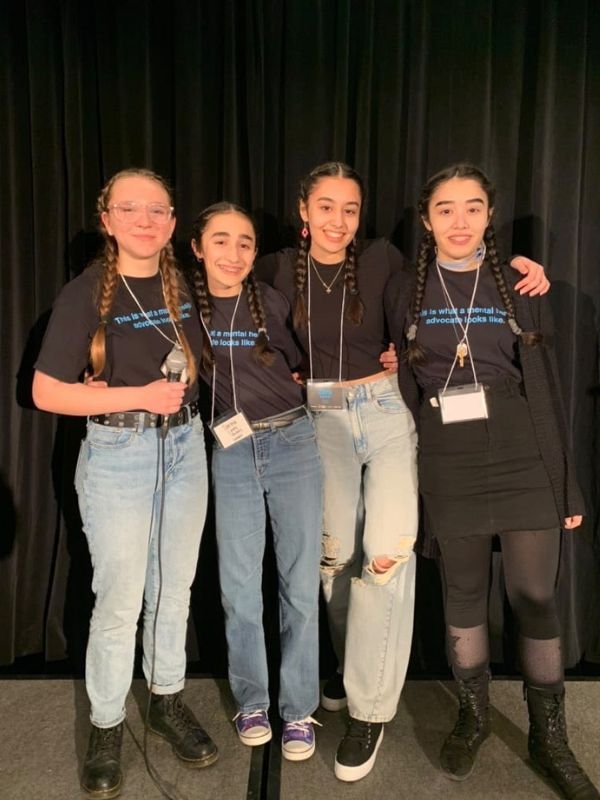
- Details
- By Sarina Lyons, Taliah Lyons, Zara Lyons and Ayla Martin
Did you know that in Ontario, three times as many young people are dying of overdose compared to a decade ago?
This article was originally published by Filter, an online magazine covering drug use, drug policy and human rights through a harm reduction lens. Follow Filter on Facebook or Twitter, or sign up for its newsletter.
Across Canada, many teenagers are experimenting with drugs alone because they don’t feel safe telling others. But when people use alone, they overdose alone. To reduce youth overdose deaths we need to reduce the stigma that surrounds drug use. And to do that, we need peer educators youth can relate to because they share common experiences—like growing up in the overdose crisis.
This is why, in 2021, we came together to form Talk Overdose. The four of us, female Indigenous teens aged 14-19, deliver virtual and in-person overdose prevention education to youth groups. Our curriculum is for grades 7-12, because these years are when many youth are first introduced to opioids.
We include naloxone training, preparing students for what to do if they find themselves responding to an overdose. We also have guest speakers with lived experience of using unregulated opioids, and interactive workshops that demonstrate how to listen with empathy rather than judgment. We talk about overdose prevention in the context of mental health factors that often impact people in our age range, like body image or bullying.
We’ve struggled to find schools willing to host youth-to-youth peer education about overdose prevention and harmful stigma.
Since we began Talk Overdose in 2021, we’ve reached over 1,500 youth across Canada. We’ve also expanded to a second project delivering Indigenous culture workshops. When people feel connected to their culture, it has a positive impact on their mental health and wellbeing and empowers them to take more precautions and fewer risks.
But we’ve struggled to find schools willing to host youth-to-youth peer education about overdose prevention and harmful stigma.
School administrators can play a vital role in facilitating these connections. Sometimes they will tell us that they support our message, but would like the students to hear it from adults rather than have us deliver it. But it wouldn’t be our message that way. And it wouldn’t be peer-delivered education.
 Talk Overdose Founders Ayla Martin, Sarina Lyons, Zara Lyons and Taliah Lyons
Talk Overdose Founders Ayla Martin, Sarina Lyons, Zara Lyons and Taliah Lyons
As authorities often point out, youth are more likely to listen to their peers than to adults—especially when it comes to drug use.
Drug use can be a sensitive topic, and discussing it openly can be hard. But if we don’t talk about it, then people will continue believing harmful stereotypes. If schools want to combat youth overdose, they must make an active effort to connect youth with accurate harm reduction information.
Peer education is consistently shown to be an effective way to do this. And, as authorities often point out, youth are more likely to listen to their peers than to adults—especially when it comes to drug use.
Please help us build safer, more compassionate communities where youth aren’t made to feel ashamed of using drugs, or of talking about them. Education + empathy = Saving Lives.
Help us defend tribal sovereignty.
At Native News Online, our mission is rooted in telling the stories that strengthen sovereignty and uplift Indigenous voices — not just at year’s end, but every single day.
Because of your generosity last year, we were able to keep our reporters on the ground in tribal communities, at national gatherings and in the halls of Congress — covering the issues that matter most to Indian Country: sovereignty, culture, education, health and economic opportunity.
That support sustained us through a tough year in 2025. Now, as we look to the year ahead, we need your help right now to ensure warrior journalism remains strong — reporting that defends tribal sovereignty, amplifies Native truth, and holds power accountable.
 The stakes couldn't be higher. Your support keeps Native voices heard, Native stories told and Native sovereignty defended.
The stakes couldn't be higher. Your support keeps Native voices heard, Native stories told and Native sovereignty defended.
Stand with Warrior Journalism today.
Levi Rickert (Potawatomi), Editor & Publisher

